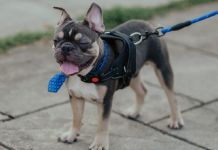Scratch Dog or Not – Are Samoyeds Hypoallergenic?
For some, being in the same room as man’s best friend can cause a shedload of misery including a runny nose, watery eyes, shortness of breath or a nasty rash, not pleasant! With 10% of Americans suffering pet allergies is it any wonder hypoallergenic dogs are becoming more popular?
Now, while many of us may automatically think of Poodles and Schnauzers as allergy friendly dogs, the Samoyed with its dense white coat wouldn’t necessarily spring to mind. Do Samoyed dogs shed? Yes, a lot! but as dog’s hair isn’t usually the trigger of a reaction, can these fur balls really coexist with asthma and allergy sufferers, let’s find out?
Is It True, Are Samoyed Dogs Hypoallergenic?
Samoyeds have no doggy odor and produce little dander which is why they often appear in lists of hypoallergenic dog breeds. Dander is one of the main causes of allergic reactions these small flakes of dead skin cause a lot of problems and due to the thick coat of this breed, they are prevented from becoming airborne hence the hypoallergenic tag. However, this dog sheds, a lot (They blow their coat once or twice a year) and all that hair will likely have dander attached as well as lots of other allergens the fluffy coat attracts like pollen, saliva, dust etc.
More so than any other so-called hypoallergenic breed it is essential to spend time with these dogs before committing to ownership. So, is the Samoyed hypoallergenic? With certain precautions, they may be suitable for mild allergy sufferers but may trigger the sneezes in many more.
What does hypoallergenic actually mean?
Let’s be clear Hypoallergenic does not mean totally allergy-free, if it did, there would be no such thing as a hypoallergenic dog breed as even the hairless ones harbor proteins in their skin, saliva, and urine that can make someone break out in hives. The word’s definition is “less likely or reduced chance of causing an allergic reaction” so in theory the Samoyed could be classed as a hypoallergenic dog breed. In practice, these beautiful smiley dogs are unlikely to be allergy-friendly to the majority of pet allergy sufferers.
3 Reasons Why the Samoyed Is a Choice Breed Among Allergy Sufferers
- People mistakenly think a dog’s hair is the problem for allergy sufferers, however, dander is the biggest problem and the Samoyed has less dander than many breeds. Samoyed dander also has another big advantage for allergy sufferers.
- The protein in dander, saliva, and urine that causes the typical symptoms in pet sensitive folk is the KNF-1 protein, choosing a breed that has low levels of KNF-1 can help build a tolerance. Step forward the Samoyed which has very low protein chains.
- Like many of the allergy friendly dogs, the Samoyed produces no doggy odor. Owning one of these adorable dogs will not have your home smelling like a kennel.
Samoyeds and allergies – What should I do?
If anyone in your home has asthma or pet allergies and you decide the hypoallergenic Samoyed is the breed for you, the key word is caution. Do not rush out and impulsively purchase a Samoyed for sale, before doing extensive research and spending time with the breed.
A growing percentage of dogs in rescues and shelters are there because of this reason. It is important to choose the right dog and even better have some form of back-up in a sales contract in case a reaction occurs down the line. Buying any dog when you suffer from allergies is a risk and one that should not be undertaken lightly. Some things you could try before bringing a Samoyed into your home include:
- Contacting a breed specific Samoyed rescue, they may be able to put you in touch with local contacts who are looking for temporary foster homes for dogs, a sort of try before you buy. This will give you a good indication of your tolerance to the breed and you never know, you may fall in love with your charge and decide to adopt, it’s a win, win situation.
- • Alternatively, you could join online forums and groups, talk to other owners, breeders and find local events or fun days you could attend. Spending time with a number of Samoyeds will definitely test your reaction and if you don’t break out in hives or see the day through runny eyes, it may be, the Samoyed just might work. (Give it a few days though some reactions take a while).
5 Ways to Reduce the Risk of An Allergic Reaction from Your Pooch
The long hair of the Samoyed will attract other allergens like pollen and dust so keeping this under control will help. Have someone (not yourself, unless wearing a mask) groom your pooch daily outside away from any open windows. This needs particular attention when the Samoyed blows their coat twice a year and you may need to invest in a special tool to remove the undercoat.

Source: Barkpost.com
- Avoid soft furnishings, any hair shed around the home will cling to things like cushions, curtains, rugs etc. Having hard floors and wipeable surfaces are a lot easier to clean and keep allergen levels down
- Feed your dog a diet rich in fatty acids and omega 3. These will keep the skin and coat in top condition meaning fewer flakes of dry skin, and less broken or damaged hairs floating around.
- With this breed, more than some other hypoallergenic dogs, it may be wise to invest in a good HEPA filter. These work by removing particles in the air and are 99.97% effective down to to the size of 0.3 microns
- Discuss with your allergist symptoms can sometimes be controlled by allergy shots or over the counter medications if not too severe
- Wash everything belonging to your pet regularly including toys, saliva can be one of the worst triggers of an allergic reaction so use gloves when picking up chew toys and make sure soft toys are washed above 60°
All about the Samoyed – Origin of the Breed

Source: samoyedclubofamerica.org
The Samoyed dog, Siberian Samoyed or Bjelkier as it is sometimes known in Europe is an ancient breed and was originally used to herd reindeer, hunt and pull sleds for the Samoyede people in northwestern Siberia. These people even used Samoyed fur to make clothes, it is said these garments could withstand the harshest of climates. The nomadic tribesmen were peaceful and expressed great love for their four-legged friends, often treating them as a member of the family.
Consequently, their dogs developed an unfailing sense of loyalty and trust which can be still be seen in the breed to this day displayed in their affection and playfulness around children. They were used in many of the early expeditions to the poles and endured terrible hardships.
The first American Samoyed was a Russian import given as a gift by Grand Duke Nicholas and was registered with the American Kennel Club in 1906, Most modern-day Samoyeds can trace their ancestry to dogs which were imported after the first World War.
An adaptable breed the smiling Sammy is popular because of his stunning looks, loyalty and gentle personality, famous owners of the breed include the late Karen Carpenter who owned one called Mush.
General Appearance
The first thing anyone notices about the Samoyed dog breed is their lush white coat, other Samoyed colors include biscuit or cream, if you see an advert for a black Samoyed it will either be a crossbreed or an anomaly bred by backyard breeders, this color is extremely rare and classed as a fault in the breed. The extra thick double coat protects them from the elements and surprisingly cleans very easily.
The standard Samoyed size can be anything from 19-23″ at the shoulders, these days as with many breeds there are individuals who breed miniature Samoyeds and even giant Samoyeds but these are unlikely to be 100% purebred. Strong and powerful they are deep-chested with a broad triangular shaped head; the lips are black and curve upwards giving these lovely dogs a perpetual smile.
Temperament
Samoyeds are intelligent, gentle, playful and affectionate, his loyalty makes him good guard dog but this is not a breed that does well left outside for long periods of time he bonds usually with one member of the family but is close to everyone and likes to be with his pack.
The Samoyed temperament is still that of a hunter and he does not do well with smaller animals and should not be let off leash in case he gives chase. As with any dog temperament is influenced by breeding, training, and socialization, when choosing Samoyed puppies, they should be confident, friendly and curious.
All the spitz-type dogs are independent thinkers and can be a challenge to train and the Samoyed is no exception, so needs consistent training and may well benefit from puppy classes.

Source: animalso.com
Health
Because the Samoyed is an ancient breed, over the years they have seen little genetic manipulation and are therefore relatively healthy with a lifespan of around 12-15 years. However, like all breeds, there are some issues to be aware of and these include;
- Eye problems – This breed can be prone to a number of eye conditions such as Glaucoma, Cataracts, Distichiasis and Progressive Retinal Atrophy, the best Samoyed breeders will provide certification that the parents have been tested for X-Linked Progressive Retinal Atrophy and Retinal Dysplasia/OSD.
- Hip Dysplasia – Many, medium to large-sized dogs can suffer from this condition but responsible breeders have reduced hip dysplasia in the Samoyed to well under 10% and if you buy a Samoyed puppy they should have the relevant documentation from the OFA
- Aortic Stenosis/Sub Aortic Stenosis – The Samoyed breed has a 2.8 greater risk than other breeds of Sub Aortic Stenosis so it important to discuss this with the breeder to establish whether they have had any screening done on the parents.
- Diabetes – This condition is unfortunately common in the breed and is usually diagnosed between 4-10 years of age, symptoms include excessive drinking, lethargy and weight loss, treatment is in the form of diet management and insulin injections.
- Hypothyroidism – This is a common problem in purebred dogs, especially northern breeds such as Huskies and Malamutes and the Samoyed is no exception, therefore breeders should have their breeding stock tested annually.
All breeders should be happy to discuss any concerns you may have about the health of your new Samoyed puppy and have the recommended test results to show you from the parents You should check CHIC’s website where you will be able to see if your chosen breeder’s dogs have these certifications.
Food
As with many of the sled dogs, the Samoyed is not a hearty eater and will eat a relatively small amount compared to dogs of a similar size, therefore, it is essential you make sure he is getting the right nutrients.
Discuss with the breeder what their feeding program entails and continue it if possible, if you do make changes, do it slowly and your puppy may need encouragement like meat juices or fat added to kibble to stop them becoming picky.
Dogs, like people, can be allergic to certain ingredients. Recently research has suggested that dog foods containing lamb and rice, or poultry carry the least risk of food allergies. The absence of additives, chemical preservatives, wheat, and soy are also recommended.
Do your research and feed a balanced diet throughout the various stages of your Samoyed’s life a common problem with this breed is obesity, which can cause serious health problems, so watch those treats.
There are also supplements which can be added to food to ensure the dog’s coat stays in tip-top condition with added sheen, fish used to be the main diet for these dogs back in the day and the oils are a natural part of their diet.

Finding A Good Cairn Terrier Breeder
Finding the best breeder with Samoyed puppies for sale is vital if you want a healthy pup which has a good temperament. A responsible breeder will be happy to answer any questions you have concerning the breed, will perform comprehensive health screening tests, and provide you with information on the puppy’s diet, socialization, flea and worm treatments etc. Most will offer ongoing support if required.
The hypoallergenic Samoyed is not suitable for many allergy sufferers and this is not always discovered until a puppy is a few months old, so choose a breeder that offers a written contract, that will let you return the puppy if you develop a serious reaction. This prevents the pup having to being rehomed or worse, sent to an animal shelter.
Don’t be in a rush, searching on Google for “Samoyed puppies for sale near me?” may seem the best option but it is best to speak to owners and experts in the breed for personal recommendations by joining online groups. Alternatively, you could contact the Samoyed Club of America which has a list of breeders, regional clubs, and rescues.
3 Red Flags to Look Out for When Searching a Samoyed Breeder
- Most Samoyed breeders are involved in other activities such as showing, agility, herding trials, sledding etc. If they just breed dogs without being members of clubs and organizations you need to ask are they just in it for the money?
- Have the parents had their hips x-rayed? Have their eyes been tested? The breeder should provide you with the relevant certification, you can also look up this information online (This is essential because Samoyeds can be prone to both hip dysplasia and genetic eye diseases).
- • Be wary of breeders that have more than one or two breeds of dogs available, it is perfectly reasonable to be involved with a couple of different breeds but having lots, is an indication the breeder is more interested in finances than the dogs.
Adopting a Samoyed from a Rescue or Shelter
For allergy sufferers adopting a Samoyed can be the best option this way you can check if the proximity to an adult dog will trigger a reaction, you could be lucky and find one in your local shelter or alternatively you could get in touch with the Samoyed Club of America who can put you in touch with a breed specific regional rescue. There is also a national network of Samoyed rescues.
Some people are put off by rescue dogs as they mistakenly think these dogs were given up due to behavioral issues but this is not always the case, perhaps the owner has passed away or is unable to care for their pet, whatever the reason these dogs deserve a second chance.
How Much Will a Samoyed Set You Back?
Samoyed price can vary depending on various factors including location, show quality, and breeder, but expect to pay between $600-$2000 for a puppy. For this price, you should bring home a healthy dog with outgoing temperament, the parents will have been screened for health problems, the litter vet-checked, wormed and had their first vaccinations. If you are wanting your new four-legged friend purely as a pet it is not necessary to pay top dollar.
If you decide to adopt your hypoallergenic Samoyed, it will be cheaper, you can expect to pay an adoption fee which will vary depending on the age and sex of the dog but it will normally be between $100-$400.

Source: pets4homes.co.uk
It’s a Wrap
So, there you have it, does the Samoyed shed? Oh, boy does it. Is the Samoyed hypoallergenic? It is classed as such, yes, due to the low amount of dander it produces and low levels of KNF-1 proteins which are found in saliva, dander, and urine and are one of the main causes of reactions.
However, the Samoyed has a lot of fur which can collect pollen, dust and other airborne allergens, therefore, this breed may not be suitable for the majority of sufferers, with this breed it is essential to spend some time with your dog of choice before bringing it into your home. If you are lucky enough not to develop a runny nose, hives or any other symptom, these beautiful, gentle dogs make a great pet.









